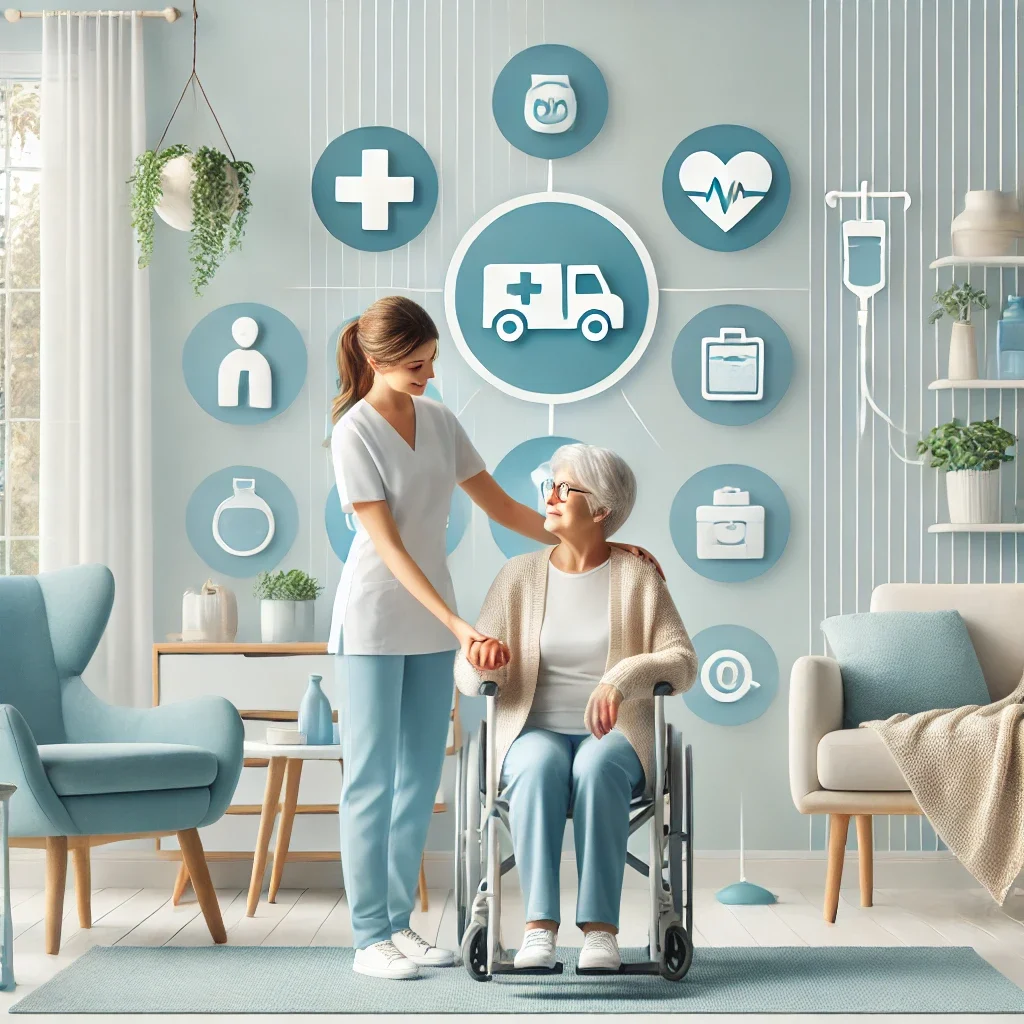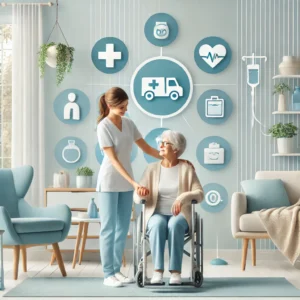Table of Contents
What is a PCA in Healthcare and How to Become One?
In the healthcare industry, the role of a Personal Care Assistant (PCA) is becoming increasingly important as more people require personal care services, particularly elderly individuals, people with disabilities, and those recovering from surgeries or chronic illnesses. PCAs provide essential assistance to these individuals, helping them perform daily activities and live more independently. This blog will explore what a PCA does, the qualifications needed to become one, and why this career can be both rewarding and in-demand.

What Does a PCA Do?
A Personal Care Assistant (PCA) helps individuals with personal hygiene, mobility, daily living activities, and household tasks. The specific duties of a PCA vary depending on the needs of the person they are assisting, but common responsibilities include:
- Personal Care: Assisting with bathing, dressing, grooming, and toileting.
- Mobility Assistance: Helping patients move around their home or healthcare facility, which may include transferring them from a bed to a wheelchair or aiding in walking.
- Meal Preparation: Ensuring clients receive nutritious meals, which may involve preparing meals, feeding, or reminding them to take medications.
- Light Housekeeping: Assisting with maintaining a clean and safe living environment by doing laundry, cleaning, and other household tasks.
- Companionship: Providing emotional support and social interaction, which can improve the client’s mental and emotional well-being.
- Medication Management: While PCAs do not administer medications, they may help remind clients to take their medications on time.
- Reporting: Monitoring changes in the client’s condition and reporting any concerns to family members or healthcare providers.
These tasks are critical in ensuring that clients maintain their independence and quality of life, especially for those who may otherwise need to be placed in assisted living facilities.
Skills and Traits Needed to Be a PCA
Being a PCA requires a variety of skills, including:
- Compassion and Patience: Personal care can be physically and emotionally demanding. PCAs need to be compassionate and patient to handle the diverse needs of their clients.
- Strong Communication Skills: Being able to communicate effectively with clients, their families, and healthcare professionals is essential.
- Physical Stamina: Assisting with mobility and performing household tasks often requires physical strength and stamina.
- Attention to Detail: PCAs must closely monitor their clients for any signs of health changes and accurately report their observations.
- Organizational Skills: Managing daily tasks for multiple clients or a busy household requires good organizational skills.
Requirements to Become a PCA
The path to becoming a PCA is accessible, and the qualifications are relatively straightforward compared to other healthcare roles. However, different states or regions may have varying requirements. Here’s a general guide on how to become a PCA:
1. Meet Basic Educational Requirements
A high school diploma or equivalent is generally required to become a PCA. Some positions may not require formal education, but a diploma increases your employment options and makes you a more attractive candidate to employers.
2. Undergo Training
Many employers provide on-the-job training, especially if you are working in a home care setting. However, some states require PCAs to complete a formal training program. These programs typically last a few weeks to a few months and cover topics like:
- Personal care techniques
- Patient hygiene and mobility
- Basic nutrition
- Infection control
- Safety and emergency protocols
Training programs can often be found at community colleges, vocational schools, or through healthcare agencies. Additionally, the federal government mandates that PCAs working in agencies receiving Medicare and Medicaid funding must complete at least 75 hours of training.
3. Certification
Depending on your state or employer, you may need to obtain certification after completing your training. Certification programs generally involve passing a competency exam. Some states require PCAs to be certified as a Home Health Aide (HHA) or Certified Nursing Assistant (CNA), which often involves a more rigorous testing and training process.
4. Pass a Background Check
Because PCAs work closely with vulnerable populations, most employers will require you to pass a background check. This ensures that PCAs do not have a history of abuse or criminal activity.
5. Gain Experience
Once you are certified and have completed any required training, you can start gaining experience. Some new PCAs begin by working in healthcare facilities, nursing homes, or hospitals to gain hands-on experience before transitioning to home care roles.
6. Continue Education
While not required, PCAs who seek career advancement can continue their education by pursuing additional certifications or becoming Certified Nursing Assistants (CNAs), Licensed Practical Nurses (LPNs), or even Registered Nurses (RNs). Further education can lead to higher-paying roles and more specialized responsibilities.
Intimidated by Writing Essays? We can take care of your assignments
Proper editing and formatting
Free revision, title page, and bibliography
Flexible prices and money-back guarantee
PLACE ORDERBenefits of Being a PCA
Being a PCA can be an incredibly rewarding career, especially for those who enjoy helping others. Here are some benefits of becoming a PCA:
1. Job Stability
As the population ages and the need for in-home care grows, the demand for PCAs is expected to increase. According to the Bureau of Labor Statistics (BLS), the employment of home health aides and personal care aides is projected to grow much faster than the average for all occupations over the next decade.
2. Flexible Work Schedule
Many PCAs have the flexibility to work part-time or full-time, depending on their needs. Some PCAs work directly for families, while others are employed by healthcare agencies. The ability to create a work schedule that fits personal needs is one of the perks of this profession.
3. Making a Difference
PCAs often form close relationships with the people they care for. They make a positive impact on their clients’ lives by helping them maintain independence, dignity, and a higher quality of life.
4. Opportunities for Career Advancement
As mentioned earlier, becoming a PCA is often a stepping stone to more advanced healthcare roles. With additional training, PCAs can become CNAs, LPNs, or RNs.
Conclusion: Why Becoming a PCA Is a Great Career Choice
If you are passionate about helping others and want to make a difference in people’s lives, becoming a Personal Care Assistant could be the perfect career for you. Not only does it offer job stability and flexibility, but it also allows you to make a meaningful impact on individuals who need your care. With relatively minimal educational requirements and the potential for career advancement, this profession offers many opportunities for growth.
Frequently Asked Questions
What is a PCA job description?
A Personal Care Assistant (PCA) provides essential support for individuals needing assistance with daily activities such as bathing, dressing, meal preparation, and mobility assistance. PCAs work in various settings like homes, hospitals, and nursing facilities to help maintain the client’s independence.
Is PCA the same as CNA?
No, a PCA (Personal Care Assistant) and a CNA (Certified Nursing Assistant) have different levels of training and responsibilities. A CNA typically has more formal medical training and can perform more clinical tasks, such as taking vital signs or administering medication, whereas a PCA focuses on daily personal care tasks.
What does a PCA do in a hospital?
In a hospital setting, a PCA assists nurses and other medical staff by helping patients with personal care needs, including hygiene, mobility, feeding, and emotional support. They play a vital role in ensuring patients’ comfort and well-being.
Is a PCA the same as a caregiver?
While both PCAs and caregivers provide personal assistance, a PCA may have more structured training and is typically employed through healthcare agencies or institutions. Caregivers, on the other hand, can include family members or individuals hired privately, often without formal healthcare training.


